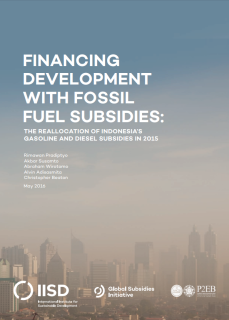
At the very end of December 2014, Indonesia introduced major reforms to its fossil fuel subsidies: removing subsidies to gasoline, except for distribution costs outside of the central islands of Java, Bali and Madura and introducing a “fixed” subsidy of IDR 1,000 per litre for diesel. At the same time, world oil prices plummeted. Together, these changes led to massive fiscal savings, equal to IDR 211 trillion (US$ 15.6 billion): over 10 per cent of state expenditure. This study investigates two central questions: Where were these savings reallocated? And is the new expenditure doing a better job for Indonesia’s development than subsidies? It concludes that fuel subsidy reform and reallocation in Indonesia have been a major step forward in improving public expenditure.
